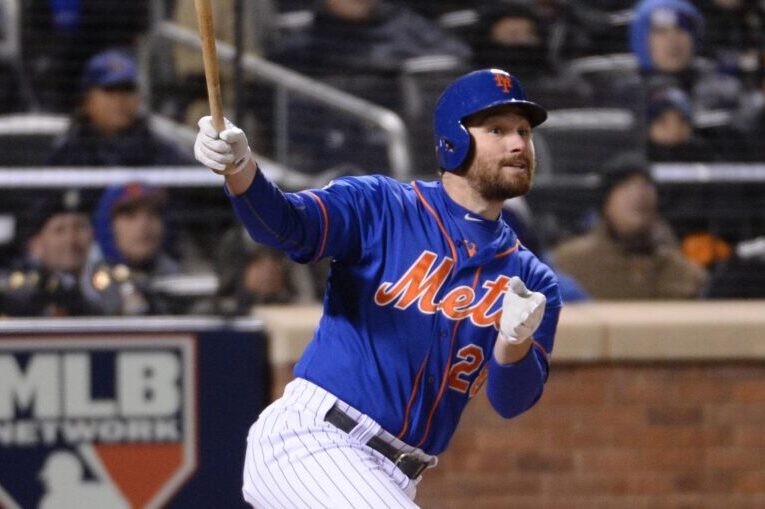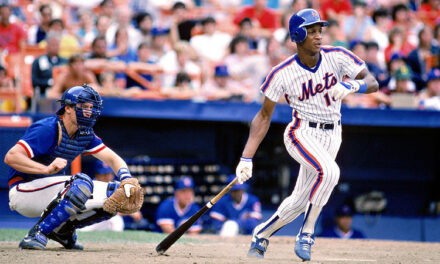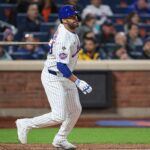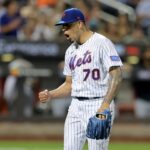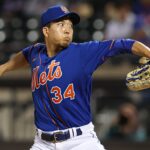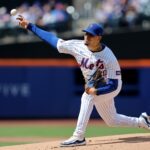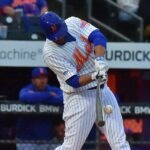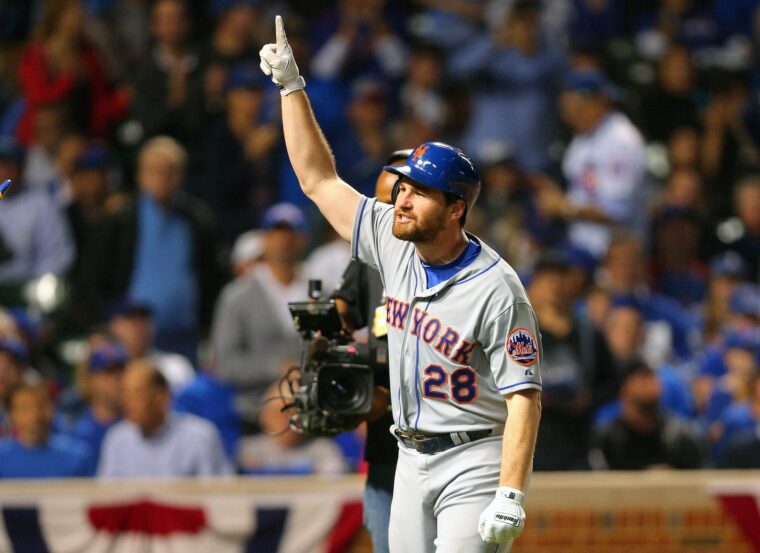
For nine games in the 2015 postseason, Daniel Murphy was the best hitter on the planet.
In five games against the Los Angeles Dodgers in the National League Division Series and another four against the Chicago Cubs in the National League Championship Series, Murphy hit seven home runs and drove in 11 runs to help lead the Mets to their first World Series appearance in fifteen years.
Anything can happen in a short series, but for Murphy – who at that point hit a career-high 14 home runs in the 2015 season – to record half of his season total in homers in just nine postseason games was something the second baseman never thought would happen.
“It was the first time that I had been to the postseason and I was scared to death,” said Murphy. “I was really nervous.”
While the number of homers Murphy hit in such a short span was incredible, the list of pitchers he hit them off of was even more impressive. Murphy homered off of Clayton Kershaw (twice), Zack Greinke, Jon Lester, 2015 N.L. Cy Young Award winner Jake Arrieta, Kyle Hendricks, and Fernando Rodney.
Murphy’s home run off Rodney was his sixth straight postseason game with a homer, snapping a tie with Carlos Beltrán (2004) and setting a new postseason record. Murphy was aptly named the 2015 N.L.C.S. Most Valuable Player.
Following his 2015 postseason heroics, Murphy signed a three-year deal with the Washington Nationals for $37.5 million. Murphy untapped his power even more with the Nationals, hitting 25 and 23 homers respectively in 2016 and 2017. He posted a combined 144 wRC+ in those two seasons; the fourth-highest mark among qualified National League hitters in that span.
Following the truncated 2020 season, Murphy retired from baseball at the age of 35. Over twelve major league seasons, the 13th round pick out of Jacksonville University in 2006 posted a career .296 batting average, 113 wRC+, 21.1 fWAR, 88.4% contact rate, and an incredibly low swinging strike rate of 5.4%.
Among 82 hitters with a minimum 5,000 plate appearances between 2008 and 2020, Murphy recorded the eighth-highest contact rate and was in a three-way tie for the eleventh-lowest swinging strike rate.
Of his twelve big league seasons, seven were spent with the Mets. Among all-time Mets hitters, Murphy ranks third in doubles (228), 12th in hits (967), 11th in total bases (1,421), and 12th in RBI (402).
I had the privilege of speaking with Murphy where he talked about his approach at the plate, memories from the 2015 postseason, and leaving New York to sign with the Nationals.
MMO: Who were some of your favorite players growing up?
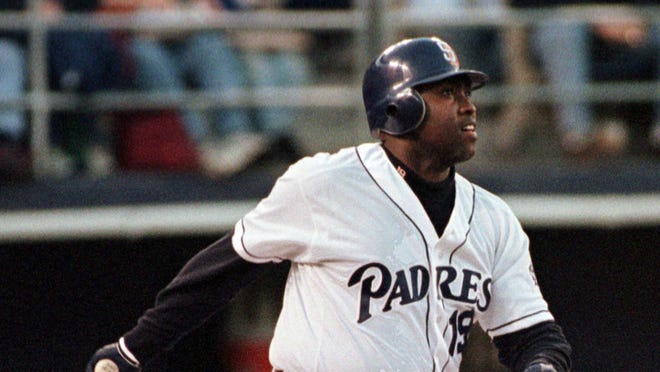
Murphy: Tony Gwynn I’d say specifically. I wouldn’t say a specific player but growing up in Jacksonville, the Braves were on TBS every night. I enjoyed the Braves and what that was from afar.
I remember you could get WGN and the Cubs during the day, and then we had access to the Braves every evening. It became Braves territory down here. They were putting quite a product on the field as well, too. It was easy to cheer for them.
MMO: What do you remember from the 2006 MLB Draft in which the Mets selected you in the thirteenth round out of Jacksonville University?
Murphy: I have a really good relationship with the gentleman who drafted me in Steve Barningham, who is still with the Mets doing international work (Director of International Scouting).
As I think back, I was hurt at the time and I didn’t feel I’d say worthy of being drafted, or that anyone was going to.
I played well as a junior but I’ve had difficulty catching the baseball for a significant portion of my career, and the same can be said for college.
Between Barningham and Tony Bernazard, I played with his son, Anthony, at JU, those two were advocates on my behalf. They took a chance on me in the thirteenth round and I had enough of school; I wanted to play baseball.
They called me on draft day and said they were taking me and here’s what they can offer. I was like, ‘Can I get this?’ They said, “We can give you this.” I said, ‘Let’s go. A new adventure.’
MMO: Were the Mets on your radar leading up to the Draft as a possible landing spot?
Murphy: Yes. The two teams I remember now are the Mets and Padres, and possibly some other ones. I think those are the teams that appeared to show the most interest.
Mets first and Steve Barningham specifically, and a bit of Bernazard, though, I didn’t get to see him much because he had other things going on at the time. He would come down and watch his son play.
MMO: You were someone that bounced around defensively, from left field to third base to first base to finally finding a position at second. What are your memories from playing all of these different positions and having to transition as frequently as you did?
Murphy: I wanted to stay. Being a reputable major league player was something I attained to. These were the gentleman who were passing out the reps and if they’re like, try left, try second, try first, I was like, I’ll do this as best as I can; rarely gracefully.
One of the last things my father said to me as I got drafted was, “Control the things that you can control.” I wasn’t a gifted defender but early in my career I had pretty good barrel accuracy. I could put the ball in play and that led to some offensive success.
They were like, this guy may have some offensive skills but he really struggles catching the baseball; let’s try and find a place for him. I was like, I love it here, tell me where to go and what I can do to try and get as good at it as I can. That was probably the way I viewed it.
MMO: Watching you early in your career was so much fun because you were someone that could easily hit to all fields and were a doubles machine (third all-time among Mets hitters). Can you talk about your approach at the plate?
Murphy: I really value contact a lot, I would say almost to a detriment at times. I would watch David [Wright] swing through pitches. Maybe he’d be looking for a fastball middle-in part of the zone, and he got a slider that he thought was it but would just swing through it. It’s like, okay, 1-1 count, I would try and make contact with that pitch and I would be out almost every single time.
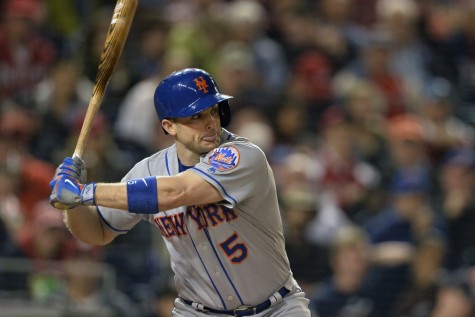
In watching David, I hopefully took that approach of I really value contact personally, but okay, what kind of contact and on what terms? I think I should really, really value contact with two strikes, but perhaps before we get to two strikes maybe I value pitch selection and damage a little bit more. Maybe I take a few more pitches or maybe I swing through a few more pitches just to not get myself out.
Early in my career, I wouldn’t say I didn’t value contact less, I just maybe changed the order a bit and kind of gauged the value of contact as I got to two strikes. And as I got to two, I was like, We need to push this thing, make them touch it. Maybe because I had such difficulty when I had to touch it that I wanted to make them touch it too.
MMO: From 2009 to 2016 and among 108 hitters with a min. 3,500 PAs, you recorded the seventh-highest Contact% at 88.9 percent. When I interviewed Adam Fisher, who played a role in drafting you, he likened you to a Wade Boggs-type hitter at the plate. Obviously, contact was a big calling card for you.
Murphy: Humbling company and I’d say very light. I had the ability to spray the ball to all fields, except Wade did it for the longevity. He had over 3,000 hits and that’s 200 hits for 15 years.
I just look at it this way: I had some good years there in Washington and I never had 200 hits even one time in my career. I think I got to 188 as my high (2013), but 200 hits for 15 years boggles my mind.
MMO: Something that you received undue criticism for was taking your contractually obligated paternity leave for the birth of your son in 2014. You handled it with class when asked about some of the backlash you received. I remember several articles and television segments coming out after that which talked about the changing times that led to a further discussion on fathers having more time with their newborn children. I’m curious if you feel like your decision helped to spark any change or discussion on the matter?
Murphy: I would say probably in a very small moment in time where I brought it to the forefront. I don’t know how long it lasted; things were moving fast for the Murphy family at the time. But I think possibly.
The interesting thing I would say about that is at that time my wife and I had chosen the route we did. As best we could I was going to try and be present.
At the same time, my mother-in-law runs labor and delivery down in West Palm Beach, so she (Murphy’s wife, Tori) wanted to do it in West Palm Beach because that’s where she felt most comfortable.
Once we decided we were going to try and get there it was like, okay, this is what we’re going to do and understanding that each family gets to choose on their own, i.e., each individual situation.
I say individual situation because fast forward, I would say it was the birth of our third son, Drew, he was born October 27, we were eliminated from the postseason with the Nationals October 12, so my wife and I were still negotiating on what was this going to look like if we were in the World Series.
We didn’t make it, unfortunately, and Drew decided it was time to enter the world. We were even still in the process of negotiating it, so even ourselves having another child it would have looked differently than the first time. I’m still uncertain on what we would’ve decided at the time.
I’m for anything that encourages fathers to be more involved. As someone who did and easily picked his career at times over being present with his family and his children and wife, any reasonable opportunities in my experience that I can have to be more present in the midst of our career I’m for.

Kim Klement-USA TODAY Sports
MMO: I remember reading how Kevin Long reached out to you after he was hired as the Mets’ hitting coach after the 2014 season and you credit him for what he did in untapping your power. Can you talk a bit about what Long presented to you in terms of mechanics and how that translated so well for you?
Murphy: I would say Kevin Long and Pat Roessler as well. K-Long reached out immediately. I remember I was with my wife and Kevin reached out and wanted to talk. We got on the phone and he started talking hitting and I was like, Man, I’m on this guy. He was just speaking my language.
I always thought of myself as a little weird, and Kevin’s a little quirky as well and we just got to talking and he was speaking my language. I was just buzzing as I got to camp. The thing about Kevin, and Pat too, is that Kevin reached out and said, “Let’s get ready and this is where we’re going.”
He had looked into all of us, and I wouldn’t say more than the other guys but me specifically so that when he came and started talking about us it was like, man, this guy has really been watching my film.
It was just an immediate connection that he cares, and if he cares this much today in December-January, what’s he going to look like when the bell rings and we’re off and running? I was so excited and we went to work in camp and I worked on some things.
I came out of the gates extremely slow in 2015, I think I was hitting under .200 heading into May. You learn some things about yourself, and one of the things I learned about myself in 2015 was about five or six weeks into the season when we went to Chicago.
I put the shackles on, which was like, I need to stop pulling the baseball because I’m having zero success doing it. I went no pull, everything goes the other way. It may not end up over there but it needs to be the approach right now or I’m just going to stay mired in this miserable slump being unproductive forever.
It was this little thing I would joke around and told K-Long, ‘I’m putting the shackles on.’ He said, “Shackles? What are you talking about?” I go, ‘I’m not allowed to pull.’ He said, ‘All right, shackles on. Got get ‘em.” And away we went.
I had some early success that series in Chicago where I shot one the other way right through the shortstop where it was like, my goodness, I didn’t know I could do that! But it felt so good.
I went from there and I think I got hurt and then came back from being hurt and I had a specific conversation with Kevin and Pat; I think it was in August. There were a couple of really good conversations I would say at the time, but one specifically was with Pat, Kevin, and myself.
Kevin said, “You need to start getting your swing off like you’re an angry human. You’re not swinging and missing at times, so how can we use that? Right now we’re using that to make marginal contact on marginal pitches. What if we get all over the plate, try to get them close to you, get your A-swing off and try to hurt somebody? This isn’t going to work.”
The reason why it wasn’t going to work, I would say, and maybe goes into the second conversation, where T.C. (Terry Collins) brought us in at the trade deadline where we added Juan [Uribe], Kelly Johnson, and Yoenis Céspedes. I would say Juan and Kelly specifically, because they were infielders and Kelly could play all over the place, T.C. brought in myself, [Lucas] Duda, [Wilmer] Flores, and [Rubén] Tejada, and looked at us and told us four turned into six with only so many positions.
It’s a meritocracy is kind of what I took from it. I wouldn’t say that I hadn’t been in a meritocracy, but not one when we’re pushing towards a postseason, which was exciting and terrifying at the same time.
I think on the heels of that, K-Long was like, “This isn’t going to work anymore. We’ve got to go.” It might have been around that time when the Nats were coming into town, all of this was happening at one time. We were able to take three from them. Cés took off and I just held on for dear life. I was just holding onto his cape, or his yellow sleeve.
MMO: Were you a player that readily utilized tech and data?
Murphy: I really enjoyed video of the opposing pitcher. Now, that might not be considered analytics, but I would say I was more aware of the angles at which you had success. I’m not certain, but my belief is that at about 10 degrees it should get over the infielder’s head if they’re playing not the full big shift. Ten degrees eliminates the infielders from trying to catch your batted ball.
I knew that and as I went from 2015 to 2016, I tried to eliminate the infielders. I was aware that these angles play well, this exit velocity plays well, and also at the same time I thought there’s still an old-school approach.
When I was coming up, it was, I want you to get a good pitch that you can hit and I want you to hammer it in the gap as hard as you can. I was like, Okay, you want me to hit it over the infielder’s head with exit velocity; drive it at twenty degrees at 102 miles per hour. That might be a homer there, if you get it to twenty-five, you’re getting in that sweet spot. Your range of success grows on your exit velocity and angles.
I would say what I was kind of focused on was wanting to eliminate the infielders from catching my batted balls. Strikeouts were number one least productive, so I wanted to miss in the air.
MMO: When you left the Mets and signed with the Nationals following the 2015 season, there was a sizable increase in your average launch angle compared to 2015 (11.9 to 16.8 degrees in 2016) and you almost doubled your barrel rate. That clearly played a huge role in your power output. Can you talk about the changes you made in your swing to put up such monster numbers in 2016?
Murphy: I would say the angle at which I was hoping for my trajectory to leave my batted ball angle. I wasn’t aware of the specific numbers but I was aware of when I hit and if I can do it properly, allowing the ball to tell me how my attack path went.
Sometimes in batting practice I would treat the batter’s box like a tee-box, so I would try to maybe hit like a high fade to centerfield. I felt like if my ball shape was slicing to left, it’s like, okay, maybe that’s not the angle of attack, let me see if I can hit a bit more of a draw to right-centerfield. That’s kind of how my brain works.
When I was at the plate I would gauge it like, if the pitcher beat me – which he’s going to a lot – am I attacking the ball in a way that can give me an ability to have success?
K-Long would talk about this, at the back of the contact window, the middle of the contact window, and the front of the contact window. Someone like Juan Soto, who is freakish, and [Jeff] McNeil, who stays in the zone so long, give themselves the ability to have success back, middle, and front of the contact window.
I felt like if the pitcher beats me and I’m late, maybe it was the timing or the velocity just snuck up on me, and I catch this thing in the back window, can I basically stay on it enough and block it over the infielder’s head for a soft line drive in front of the left fielder? Because if that’s my miss, well then, we can work on the rhythm and timing and I get to dictate when I start; maybe I start sooner, I most definitely should start sooner.
That’s the way I gauged it. If I could groove my stroke to eliminate the infielders with speed at the plate with exit velocity basically, then it turned into for me, when do I want to start? What’s going to give me the best opportunity to have success when I start? Should I be trying to hit this guy to left-centerfield, right-centerfield?
MMO: Listening to you talk about hitting makes me think that you’d make for a pretty good hitting coach some day.
Murphy: That’s really humbling, thank you. As I got into my big-league career and they let me stay – and I was super excited they let me do that – I wasn’t as nervous each day I showed up and saw my name on the lineup card. A little less nervous means that maybe I can focus a little less on my anxiety and dread and a little bit more on competing against the guy who is sixty feet away from me to try and win a ballgame.
Our thought process is able to change once we become the people who can do this thing. I feel like when you see something you value and you work towards it, you just see yourself getting better at it and you get more efficient and look for ways to get more efficient.
The thing I really loved about Kevin and Roessler was they got down into the weeds and said, “Hey, man, let’s see if we can dig out where the inefficiency is so we can be the most productive.” And I was there for it.
MMO: When you revisit the 2015 postseason and all the heroics you displayed with your incredible power surge you went on, what memories come back for you?
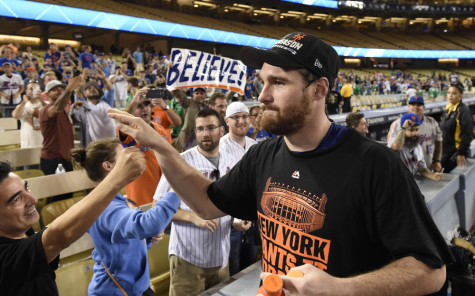
Murphy: One specifically was in the hotel in Chicago after we won Game Three and I hit another home run. My wife was pregnant at the time, and we had Noah as well, and she opened the door and looked at me and said, “What the f***?!” And I said, ‘I have no idea, sweetheart.’ We were flying right then and were up 3-0 and I was batting pretty well.
Another one would be specifically finding David, there was a picture of us embracing. David got there before all of us because David was a child freak, and Lucas and I had played in the minor leagues with him and Flo’s first spring training as a sixteen-year-old from Venezuela was my first one as well. All these guys, we had done life together. It was probably the embracing after each accomplishment and each goal achieved that was fun.
[Michael] Cuddyer as well, too, because Michael really pressed us forward in a way that I feel like he as much as anyone understood where we needed to go and how we needed to get there. It was the first time that I had been to the postseason, and I was scared to death. I was really nervous.
My first at-bat against Clayton [Kershaw] I got punched on six pitches; things were moving very, very quickly. One more memory I have that would help was in Game One at Dodgers Stadium, I’m up and Clayton chews me up and spits me out. I was completely overmatched. I was like, Well, if that’s what the postseason is like, woof, oh dear! You get a couple of innings to stew on that. I got out on defense and if they hit to me then catch the darn thing.
I come up for my next at-bat and I’m in the on-deck circle. For some reason, I decided that I was going to get my foot down early. I do it in the on-deck circle and Clayton throws one and I see it. I was like, Oh my goodness, that thing has red seams on it; it didn’t last time I was in this position. I kind of got into this position on deck where I was like, I think I may be able to put up a proper fight right here. Let’s go.
I believe I got into a 1-0 or 2-0 count, and one of the pitches I take my brother, Jonathan, is in the stands, he played professionally with the Twins. He’s really good with the swing and he’s really helped me out a lot with mine. Later on he tells me, “You took that pitch and I thought you might have seen that.” I told him, ‘I thought the same thing, Jonathan. I actually saw that one.’
On the 2-0 pitch I ended up hitting out of the ballpark and it was like, oh dear, that shocked everyone, me most of all! It was just kind of in that moment right there on the on-deck circle at Dodgers Stadium where I feel like I got into a position to put a pretty good fight. I was fortunate enough to have success.
MMO: You mentioned being able to pick up the seams off of Kershaw. Was that something you regularly tried to do with pitchers?
Murphy: I would say for me personally, being able to see the ball clearly and just an understanding of what’s coming in and an idea of the way it’s going to break was more a byproduct in telling me something that I was doing. It was a symptom of something positive or negative. If I didn’t see the ball well, it’s like something is not happening well from the ground up, from starting in my feet we have to see where the breakdown is.
For some reason, at that time, I got my foot down on deck and he threw it and I felt balance and in a position that if my eyes say that’s a good pitch to hit – of which Clayton’s not going to give you many – you’re in a good position to fire as fast as you can with freedom. That’s what it felt like.
When that happens you don’t always have success. We’ve seen guys hit the ball on the button and get nothing for it. There’s another part where I was fortunate enough at that time to get rewarded for it. Even if I think something’s beneficial, if I don’t get my reward soon enough, I may leave it right there.
I like hits, Mathew, a lot. I wanted hits. As I got older and matured and understood that this is sustainable success attacking and approaching the baseball this way at the plate, I still wanted hits! I hit one on the button to the centerfielder and he catches it, it’s like okay, good swing. But if I hit one off the cap at the third baseman and he has to put it in his pocket, it’s like, hey, man, that’s a knock right there, I get to run the bases like a crazy person now, which is a ton of fun.
MMO: Sandy Alderson said that one of his biggest regrets was not signing you after the 2015 season. At the time, was it difficult to leave New York after spending your whole career with the club?
Murphy: I would say yes, it was because of all the relationships we had built. Sandy’s comment is one of the most humbling things that anyone in the industry has said about me, even more so coming from him. Baseball is also a business and the Mets are in the business of trying to win baseball games. So, if you think you can get more value in this space by doing these moves, I will say from that perspective I look at the game with two brains: I know we’re human beings out there but also at the same time there’s a job to do.
Once the qualifying offer was declined, I think that offseason was slow moving, and a lot of things happened around the Winter Meetings. The interest felt very tepid at the beginning anyway. It didn’t surprise me or hurt my feelings; it was like apparently this is the way markets work.
When it was trade for Neil [Walker] and sign Asdrúbal [Cabrera], I kind of felt like I was back in the room with T.C., where there’s only a couple of chairs and a lot of people sitting right here. I felt like the Mets didn’t seem like a viable option anymore.
At that point, my market was quite quiet until December 24. I was more concerned about finding a job then I was upset at the Mets may have scorned me, which I don’t feel that way. I wanted work. Becoming a free agent was nice but I think Ian Desmond signed a one-year deal, which is not that Ian didn’t get great money. But part of going to free agency was hopefully having the opportunity to sign somewhere for multiple years.
It was then getting more and more outside of my control and as we got closer to Christmas that was when we started talking more seriously with the Nats, and I just wanted some work! Tori was pregnant with our second child, and I was like, I need a job. When January hits for me as a player, my eyes immediately turn to spring training. That’s the way I think about it.
I think of Apollo Creed when he decides he’s going to call in his favor with Rocky: ding, ding! For me, January was one of those moments where it’s here we go. To not know where I was going was a very fearful unknown that I didn’t want to experience for myself or my family.
MMO: Do you have any aspirations to get back into the game in some aspect?
Murphy: I would say yes. My oldest son Noah is playing, and I get out there and yuck it up a bit with him. I’m enjoying that. I probably would say right now my short-term focus has been trying to attend to my wife and children in a uniquely different way when it’s 7-8 o’clock. I always had half an eye on 7 o’clock, and probably more realistically, Mathew, was more like a full eye. I always knew when I was trying to prepare for a game. I’m trying to be more present now.
I took a couple of classes at JU, the college down here, and took a philosophy and history class. It kind of blew my mind. I have my degree, I did not have the necessary required classes, but I have a pretty good relationship with our university. They were like, “Take these two classes and we’ll sort your degree out.” One class was online and the other was on site; the philosophy class was on site and was a blast. I’m this old mid-thirty guy in the back with the freshman class, but I had a blast.
MMO: What does coming back to New York for Old Timers’ Day mean to you?
Murphy: I find myself drawn to the Mets. The way I watch baseball now is I follow the Mets and then I’ll watch the Rockies because that’s who I’m most familiar with. That’ll be the last team of guys in the league who leave me behind in the dust. I cling to the Rockies and then I find myself watching Mike Trout out West. But I’m drawn to the Mets.
The Mets, their organization, and fans have afforded me and my family an opportunity to grow up hopefully as a human being and as a baseball player. I’m just supremely grateful for that opportunity because it’s a blessing that I didn’t expect, but while I was there the team and fans were so good to me.
When Jay [Horwitz] reaches out, who is difficult for me to say no to, and I’d say my wife loves a proper adventure, so we’re coming up with the whole crew. I’m looking at the roster of guys who are going to be there and I’m going to try and soak up the wisdom and try to prepare myself to see if I can fake it for I think six outs.
I’m humbled to be asked to come and Mr. Cohen invested in this and being receptive to the fans. If I’m not mistaken, he put this out on a poll to the fans, so that receptivity by him and the conversations with Jay who’s been turned loose to express himself. My wife told me we weren’t passing up a trip to New York. And I told her she’s right, we’re not passing that up so away we go.
MMO: When you look back on your career, what are you most proud of?
Murphy: I didn’t think they’d let me stay there that long. Some of it I would say in a bit of vanity is we made sacrifices and we’re blessed in ways we couldn’t control, but made enough sacrifices to stay.
The other one would be the relationships. As my wife has started a non for profit called Prom Series, which is her moving into the space of middle school and high school-aged foster care girls and she provides prom dresses and provides an evening and experience. She has girls come in from foster care and prom dresses are laid out for them to pick, dressing rooms set up, hair and makeup [provided]. It’s like, the God of the universe loves you, and we’re going to show that to you tonight. You’re worth being seen and loved, and that’s what my wife does.
She just did one in Baltimore, she’s done one here locally, and in Denver. That’s probably why Denver is so special [because] they allowed my wife to be the first to express herself in this way and did an event there in 2019.
She’s doing a back-to-school drive, I think this will be her fourth annual one, where she allows the wives, girlfriends, and fiancées of the players in each city to buy and purchase and express themselves for buying clothes for girls in foster care hopefully in their own city. They send it out and it gets organized and shipped to these girls for back to school. She’s hoping for all thirty teams being able to participate this year; it’s been quite close.
She’s unable to do that without the relationships that we were graciously afforded to make while we were allowed to stay. It’s been really fun to watch. I’m her secretary and I get to cheer my wife on the way she cheered me on for all those years. She’s running it and really enjoying herself and she’s just been able to meet so many people and further fortified relationships. I’m having a blast cheering her on and I take things to UPS and FedEx, that’s my job.
MMO: Thanks so much for some time today, Daniel. It was great chatting with you.
Murphy: I really appreciate that, Mathew. Thank you.


